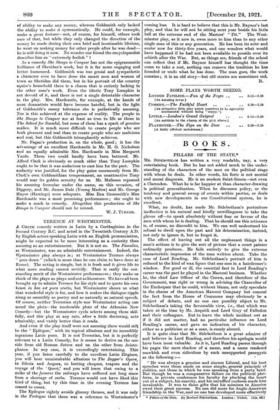TERENCE AT WESTMINSTER.
A GREEK comedy written in Latin by a Carthaginian in the Second Century B.C. and acted in the Twentieth Century A.D. by English actors speaking Latin with an English pronunciation, might be expected to be more interesting as a curiosity than amusing as an entertainment. But it is not so. The Famulus, at Westminster, was an admirable entertainment. Indeed, the Westminster play always is ; at Westminster Terence always " goes down " (which is more than he can claim to have done at Rome). The acting is simple, but it is fresh and it gives life to what mere reading cannot revivify. That is really the out- standing merit of the Westminster performances ; they make us think- of the plays as plays and not as literature. We have all been brought up to admire Terence for his style and to quote his own - boast in has est pura oratio, but Westminster shows us what that wonderful style is for, and how it makes the dialogue ripple along as smoothly as poetry and as naturally as natural speech. Of course, neither Terentian style nor Westminster acting can mend the plots—the intolerable plots of the Athenian New Comedy—but the Westminster cycle selects among them skil- fully, and this play at any rate, after a little doctoring, acts admirably, and vastly better than it reads.
And even if the play itself were not amusing there would still be the " Epilogue," with its topical allusions and its incredibly ingenious Latin puns. It is not Terentian, but it is perfectly relevant to a Latin Comedy, for it seems to derive on the one side from old Roman Satura and on the other from Aristo- phanes. In any case, it is exceedingly entertaining. This year, if you listen carefully to the excellent Latin Elegiacs, you will hear unmistakable allusions to The Beggar's Opera, to Silesia and Angora, to betting cheques, teapots and the voyage of the Quest,' and you will learn that owing to a strike of the fosaores the railways have suffered not long since from a shortage of carbo. Terence would not have liked this kind 'of thing, but by this time in the evening Terence has ceased to count.
The Epilogue rightly avoids gloomy themes, and it was only in the Prologue that there was a reference to Westminster's
coming loss. It is hard to believe that this is Mr. Raynor's last play, and that he will not be sitting next year beside his little bell at the extreme end of the Masters' " Pit." The West- minster play, as it now is, owes more to him than to any other single man of this or any generation. He has been its actor and auctor now for thirty-five years, and one wonders what would have happened if he had not been available to preside over its rebirth after the War. But, as things are, friends of the school can reflect that if Mr. Raynor himself has thought the time come to take a rest, nothing can remove the tradition he has founded or undo what he has done. The man goes, the work remains ; it is an old story—but old stories are sometimes sad.
R.


































 Previous page
Previous page